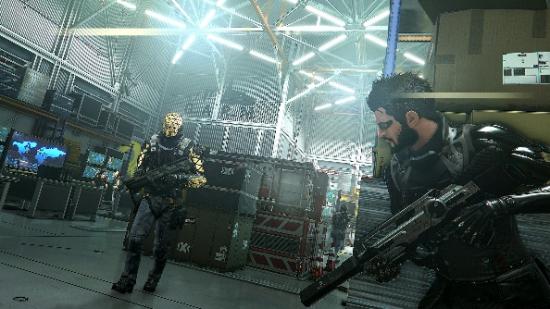While a lot of the focus for Deus Ex: Mankind Divided lands on the massively varied gameplay styles and explosive/stabby/hacky augmentations, it’s common knowledge that the cyberpunk series’ backbone is its strong, complex story. Human Revolution introduced us to the earlier years of augmented society, but Mankind Divided takes us to its darkest days: the ‘mechanical apartheid’.
Become immersed in worlds filled with rapid-fire death in the best FPS games on PC.
During the final moments of our last tenure in this gold and black universe we were asked to make a monumental decision. How did that affect the world? Whatever you decided to do, be that allow transhumanism to flourish, die, or come under strict regulation, is brought into Mankind Divided. Well, kind of.
“What happened in Human Revolution – the so-called ‘canon’ ending – is whatever you as a player did,” smiles Mary DeMarle, executive narrative director on Deus Ex: Mankind Divided. “The outcome of that event was mass confusion. There’s only three people in the world who know what message Adam Jensen sent out: Adam, Eliza, and you.”
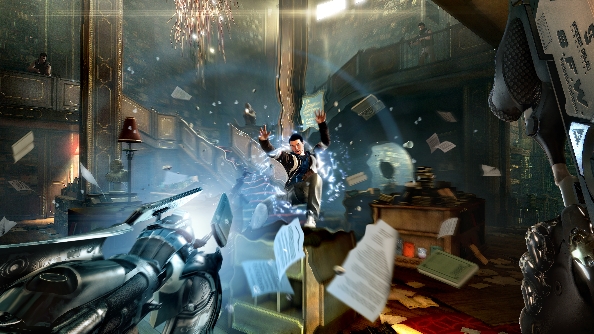
That mass confusion allows a fresh start for the events of Mankind Divided, and it’s not a pretty one. “All the world knows at this point is that there was this event in which more than 50 million people were killed, maimed or injured all over the world,” DeMarle explains. “A lot of people have turned to their emotions and now fear the augmented. There’s a been a global rise in fear, paranoia and segregation. People are calling for separation and a restriction of rights in order to bring about peace again.”
And so begins the concept of mechanical apartheid, a situation that by its very wording indicates that Deus Ex is a game about racism. Taking inspiration from the historical South African situation, mankind is literally divided as augmented people are forced to live apart from their ‘pure’ human brethren. Skin colour may not be the issue within Deus Ex’s world, but the tensions, viewpoints, and attitudes resulting from that segregation clearly parallel the issues we face in reality regarding race.
The idea for mechanical apartheid has its roots in transhumanism philosophy. When researching for the first game, the development team discovered that there are numerous schools of thought on how a transhumanist future could progress. “There are several scenarios – heaven, hell, and prevail,” reveals Jean-François Dugas, the game’s executive director. “The heaven scenario is about how everything will be good and perfect with rainbows and unicorns. The prevail scenario is about how we can circumvent the challenges [and] get these technologies to co-exist with us. The hell scenario believes that the world will be full of problems, that we as humans might disappear. For Mankind Divided, it’s about exploring the theme of hell.”
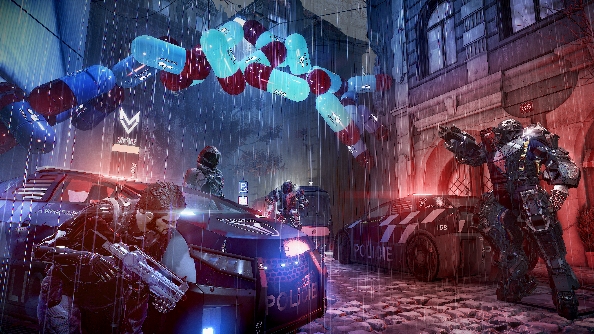
For you as a player, transhumanist hell is delivered in the way characters treat you in. With his mechanical arms and black plastic jutting from his face, protagonist Adam Jensen is one of a group of people feared and hated by many, including those he works for.
“He’s working for the establishment, hunting down terrorists in a world where people – even his colleagues – see him as a terrorist,” says DeMarle.
There’s no rest for him in the segregated areas reserved for augmented people, either: “When he goes into the augmented world he’s also an outcast there because he’s too shiny, too beautiful and too nice.”
Around Deus Ex’s world, NPCs will make you feel unwelcome and unwanted. Cops will pull you aside, interrogating you for no reason other than your metal limbs. You’ll be denied access, denied answers, and shunned by the population.
Creating a hostile atmosphere has been an interesting challenge for the dev team, who realise there’s only so far you can go. “If everyone dislikes you, you’ll feel like you can’t do anything and it’s not fun,” points out Dugas. “We have to find the right balance between you feeling like being an outcast, a stranger in a strange land, and also being able to explore the city and its environments at your own leisure. It’s always this fine line.”
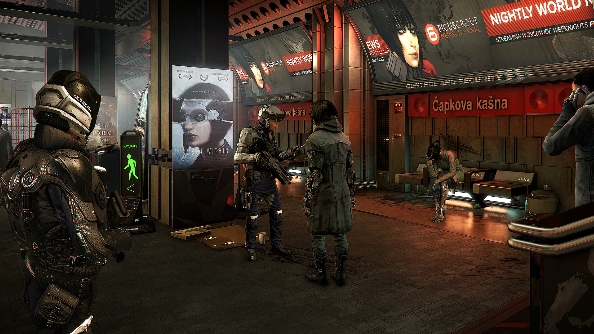
While Jensen is despised by the people around him, Mankind Divided sees him come to terms with his own self-loathing. You may recall the shattered mirror in his apartment in Human Revolution: a sign that Jensen couldn’t even look at himself after having his arms replaced with robotic attachments. These days he’s more comfortable in his own skin, and that’s made apparent in the way players can use him.
“Like our catchphrase says, at some point you need to let go and embrace what you are,” enthuses Dugas. “Translating that into gameplay means multiple active augmentations and combat-oriented ones. We redesigned the control scheme to make things more fluid, and mapped the augmentations on the D-pad and the shoulder buttons so you can be in the middle of the action and trigger something.” By offering players easier mastery over augmentations, the picture that Jensen is more confident in his altered body is complete.
By presenting transhumanist hell through the eyes of Jensen, Dugas hopes that Mankind Divided will get people talking about science and philosophy. Those debates will be on players’ on terms though.
“The thing that’s important is the game is not us giving a message, we’re not saying this is right and this is wrong,” emphasises Dugas. “It’s about us exposing these ideas with all the pros and cons of what we’re exploring. We want to stay in the middle and have the players forge their own conclusions. What we think is not important.”
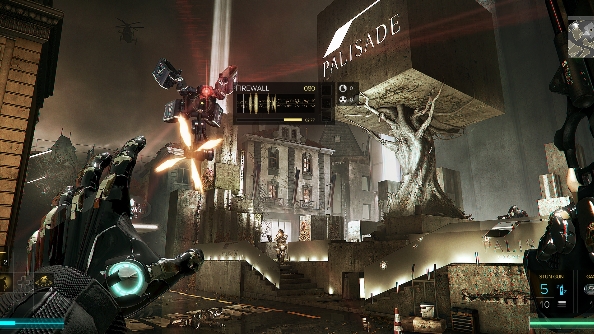
The world of 2029 seems a more outright hateful and upsetting one than any Deus Ex we’ve played before. It’s interesting to see it lay its own path, one that’s simultaneously familiar and different to the sinister, shadowy future of the original Deus Ex. Even more interesting is that the team don’t feel like they’re under any pressure to conform or meet the lore that we know from the world of 2052.
“When you play Mankind Divided, what we’re doing is your history, but history is written by the winners. So is what you knew real, or not?” grins DeMarle. “There are going to be certain signposts that don’t change, but when you actually play through those signposts will it play out the way you thought it would, or will you suddenly getting a new perspective on it?”
“I’m a big fan of that narrative storytelling where you can tell the same story from three different eyes and you’re like ‘Wow, I never knew that!’ It’s not as confining as some people think and it spurs on a lot more creativity,” she adds.
This approach to established history is a manner of thinking that certainly suits the world of Deus Ex and its network of lies and conspiracies. And with 25 years of the timeline left to explore, no doubt things will come closer to what we know as future installments happen. But for now, Eidos Montreal’s vision of a mechanical apartheid hell is yet another incredibly strong angle for the series, and could well the the biggest game narrative accomplishment of the year.
